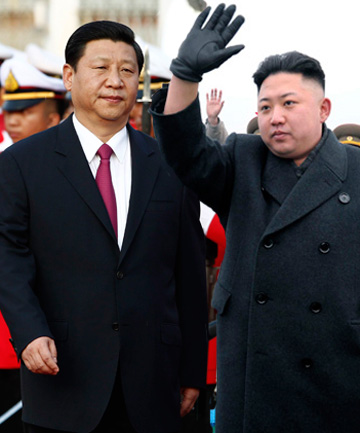Deciphering China’s Coal Ban from North Korea:
 For years, the Chinese have remained soft towards North Korea when it came to imposing sanctions on them for their nuclear and ballistic missile tests. The United Nations Security Council (UNSC) has prohibited Pyongyang from testing nuclear and ballistic missiles but yet Pyongyang has continued to do develop and conduct nuclear and ballistic missile tests. In February 2017, North Korea test fired a ballistic missile which was reported to be a modified version of their Musudan missile with range of 2500-4000km. At present, North Korea’s missile arsenal consists Scud-D, Nodong, Taepo Dong-1 and 2 and Musudan ballistic missiles. In addition, North Korea is also working on submarine launched ballistic missile (SLBM).
For years, the Chinese have remained soft towards North Korea when it came to imposing sanctions on them for their nuclear and ballistic missile tests. The United Nations Security Council (UNSC) has prohibited Pyongyang from testing nuclear and ballistic missiles but yet Pyongyang has continued to do develop and conduct nuclear and ballistic missile tests. In February 2017, North Korea test fired a ballistic missile which was reported to be a modified version of their Musudan missile with range of 2500-4000km. At present, North Korea’s missile arsenal consists Scud-D, Nodong, Taepo Dong-1 and 2 and Musudan ballistic missiles. In addition, North Korea is also working on submarine launched ballistic missile (SLBM).
While China had opposed earlier the nuclear test and missile testing of North Korea and had requested for peace to prevail in the North East Asian periphery, there has been minimal effort to impose any strict penalty from China’s side on North Korea.
However, in February 2017, there were reports from China’s Ministry of Commerce that it has been decided to suspend the import of North Korean coal for the rest of the year 2017 owing to the ballistic missile tests conducted by North Korea. In addition to the ballistic missile test there is also the killing of Kim Jong Nam, elder son of North Korean dictator Kim Jong II, allegedly by North Korea. He was living in exile in a Chinese controlled territory called Macau near Hong Kong and was under the protection of China. It is believed that North Korea was concerned over Kim Jong Nam’s pro-Chinese sentiments and his business dealings in China. He was killed in Malaysia.
In 2016, China’s import of anthracite, a hard variety of coal from North Korea was 22.4million metric tonne, a sharp increase of 13% from 2015. For North Korea, on the other hand, coal seems to be the key export product and a crucial source of earning hard currency and China their largest trading partner. This step on China’s part is an implementation of the United Nations Security Council (UNSC) Resolution 2321.
However, no one is sure of whether China would seriously follow the ban it has imposed on North Korea. China has had past record of working clandestinely with North Korea despite having laid a ban or despite sanctions.
Last year, China refused to ban the import of coal from North Korea justifying that the export of coal will affect the well-being and humanitarian needs of the people in North Korea. China’s fear to impose sanctions on North Korea is well fathomed. China may have to cater to millions of North Korean refugees would cross border and come over to China should China support the sanctions too.
It would be difficult to judge how far this move of China is able to affect North Korea in a way that it gives up its nuclear program at least. For years, North Korea has used its ballistic missiles as a tool for coercive diplomacy. It has tested its missiles to express its angst and discontent on any situation. So it is yet to be seen if North Korea tests another missile to express its dissatisfaction over China’s decision. In fact, the state controlled Korean Central News Agency has lashed out at China that it is ‘dancing to the US tune.’
As far as China is concerned, if we are to believe that this move to ban coal import is a serious move, then it must be well fathomed that finally a recalcitrant North Korea has become a liability and shame than a trade partner and ally. However, China has always been worried of a down-sliding North Korean economy that would have direct repercussion on China fears of a North Korean population influx then into China. How China would manage that issue also remains to be seen. On the geostrategic front, China would not prefer a unified Korea and fears that should that happen under a Republic of Korea (ROK)-US leadership, China’s influence in the North East Asian region would decline.
On the other hand, the recent reports of US deployment of the Terminal High Altitude Area Defence System (THAAD) in South Korea will also determine how serious China would stay on its commitment to be firm with North Korea. China has always remained wary of the deployment of the THAAD system in South Korea and has raised objections time and again that the system would result in strategic destabilisation in the region negating China’s nuclear deterrent capability.
However, the fact that South Korea has agreed to the THAAD system after much apprehension in the past in fear of not annoying the Chinese, does prove that Seoul has given up on the hope that China would act strict with North Korea despite the Chinese commitments. Obviously, these lessons, Seoul has only learnt from the past.
Debalina Ghoshal is a Research Fellow with the Centre for Human Security Studies based in Hyderabad specializing in nuclear, missile and strategic issues.
Related posts:
Category: FOREIGN POLICY & SECURITY, SOUTH ASIA & ASIA PACIFIC

